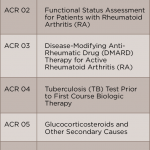In the near future, the most demanding audience will be those who pay for the care we give. Based on anticipated legislation to fix the Sustainable Growth Rate formula and provisions of the Accountable Care Act, the federal government is poised to be the first entity to ask rheumatology professionals to demonstrate that we are engaged in improving care practices and outcomes for our patients. The Centers for Medicare and Medicaid Services (CMS) will pay us based on how well we perform in these areas, and other payers will probably follow suit.
The ACR recognizes the importance of helping members meet these practice metrics and the value of a rich repository of patient data (with the identity of the patient and the provider removed). These accumulated data can be a resource for our members and other stakeholders seeking answers to a variety of questions and will be of enormous value to researchers.
These data can also be used to increase awareness and discussion around rheumatology, which will enhance appreciation of our subspecialty. In the emerging healthcare economy, RISE data will help the ACR identify and quantify the value of rheumatologists and other rheumatology professionals for policymakers. Using RISE, clinicians can more easily demonstrate to lawmakers, insurers, and administrators the quality of care provided by rheumatologists.
Meeting Reporting Requirements
It seems we all spend an inordinate amount of time and energy reporting to the myriad entities requesting various data from us, including the CMS. RISE can collect the data needed to comply with current CMS reporting requirements. When RISE is integrated into an EHR, it allows a single data entry for:
- Filing quality-based incentive payments;
- Avoiding penalties;
- Complying with reporting requirements; and
- Tracking caseloads for quality monitoring and improvement initiatives.
I’m excited to be able to participate in the RISE registry. This resource will help us as a rheumatology community answer important comparative effectiveness research questions that will be useful to improve patient care and outcomes.
Making Discoveries that Advance Rheumatology
Our annual meetings showcase improvements in the treatment and diagnosis of rheumatic diseases. RISE advances rheumatology by providing a source of information on patient outcomes and quality care for rheumatology. This information can lead to new discoveries, help us better understand rheumatic diseases and their treatment, and act as a source of comparative effectiveness research.
Why Is the ACR Investing in RISE?
The ACR recognizes the value of harnessing the power of technology to advance the quality of patient care and maintains the fundamental belief that there is hope for improved outcomes for people with, and at risk for, rheumatic diseases. By working together through RISE, providers, researchers, and the ACR will help achieve solutions that transform care. As we introduce and fine-tune RISE, your involvement and feedback will be vital to its success and growth.
How Can My Practice Become Part of RISE?
The RISE team is currently creating the mechanisms to connect to a variety of EHRs and collect de-identified data in a common repository. We are very interested in adding more practices to RISE.



